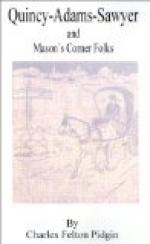Next morning he was up early, for he knew that a busy day was before him. The last thing before retiring, and the first thing upon getting up, he examined his inside vest pocket, to see if that precious letter, that priceless trust that he had given his knightly word to deliver, was safe.
He breakfasted early, and eight o’clock found him in Bowdoin Square, at the corner of Green and Chardon Streets. His first visit was to a safe manufactory, a few doors from the corner, where he purchased one for the firm of Strout & Maxwell.
After traversing both sides of Friend Street, he finally settled upon two horses, stout country roadsters, and left an order for their shipment to Eastborough Centre, when they were notified that the wagons were ready. He bought the wagons in Sudbury Street. They had red bodies and yellow wheels, and the words, “Strout & Maxwell, Mason’s Corner, Mass.,” were to be placed on them in gold letters.
These tasks completed, Quincy walked up Tremont Row by Scollay’s Building. Crossing Pemberton Square, he continued up Tremont Street until he came to the building in which was the law office of Curtis Carter, one of his law school chums.
“Hello, Curt!” said he, as he entered the somewhat dingy office.
“Well, ’pon honor, Quincy,” cried Curtis, “the sight of you is good for sore eyes, and I’ve got such a beastly cold that I can’t see with one eye and can’t read with the other.”
“Well,” said Quincy, “I came in here intending to consult you professionally, but I don’t think a blind lawyer will answer my purpose.”
“Oh, I shall be all right in a few minutes,” replied Curtis. “I dropped into Young’s as I came up and took an eye-opener. What’s the matter, old fellow, breach of promise?”
Quincy took a seat near Curtis’s desk.
“No,” said he, “it’s a case of animosity carried beyond the grave.”
“Oh! I see,” said Curtis, “party cut off with a shilling, going to try and break the will?”
“Have a cigar?” asked Quincy. “While you are lighting it and getting it under way I may slide in and get a chance to state my business.”
“Oh! you want to do the talking?” said Curtis good humoredly. “Well, go ahead, old man;” and he leaned back and smoked complacently.
Quincy then related as much as he thought necessary of the story of the sealed letter, and as he concluded he took the package from his pocket and placed it on the corner of the lawyer’s desk.
“You are doing just right,” said Curtis; “the probate judges nowadays are looking more carefully at wills, especially when their provisions indicate that the signer was more red Indian than white Christian. I understand you perfectly,” he continued; “what you wish me to do is to put this letter in an envelope, seal it securely, and endorse upon it these words, ’To be delivered only to Miss Lindy Putnam upon the written order of Miss Alice Pettengill.’”




